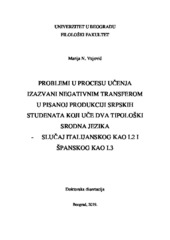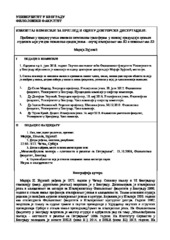Приказ основних података о дисертацији
Problemi u procesu učenja izazvani negativnim transferom u pisanoj produkciji srpskih studenata koji uče dva tipološki srodna jezika - slučaj italijanskog kao L2 i španskog kao L3
Difficoltà nel processo di apprendimento causate dal transfer negativo nella produzione scritta di studenti serbi che studiano due lingue affini - il caso dell'italiano come L2 e dello spagnolo come L3
| dc.contributor.advisor | Moderc, Saša | |
| dc.creator | Vujović, Marija N. | |
| dc.date.accessioned | 2020-02-14T14:31:01Z | |
| dc.date.available | 2020-02-14T14:31:01Z | |
| dc.date.available | 2020-07-03T10:12:06Z | |
| dc.date.issued | 2019-11-07 | |
| dc.identifier.uri | https://nardus.mpn.gov.rs/handle/123456789/11859 | |
| dc.identifier.uri | http://eteze.bg.ac.rs/application/showtheses?thesesId=7205 | |
| dc.identifier.uri | https://fedorabg.bg.ac.rs/fedora/get/o:20903/bdef:Content/download | |
| dc.identifier.uri | http://vbs.rs/scripts/cobiss?command=DISPLAY&base=70036&RID=51825167 | |
| dc.description.abstract | Predmet istraživanja ovog rada jeste uticaj drugog jezika (italijanskog) na proces učenja (tipološki sličnog) trećeg jezika (španskog) kod srbofonih studenata. Pažnja je usmerena na negativni međujezički uticaj (negativni transfer) u pisanoj produkciji informanata. Iako je godinama istraživanje transfera ili međujezičkog uticaja (Crosslinguistic Influence - CLI) na učenje stranih jezika bilo usmereno prvenstveno na uticaj maternjeg jezika (L1) na učenje drugog jezika (L2), u poslednjih par decenija uočava se sve veće interesovanje za način na koji prethodno naučeni nematernji jezik ili jezici utiču na tok učenja novog jezika (Tremblay, 2006: 109). Razlog tome je porast višejezičnih govornika u svetu i činjenica da mehanizmi učenja trećeg jezika, zbog svoje složenosti, predstavljaju potpuno drugačiji proces od učenja drugog jezika. U slučaju tro- /višejezičnosti učenikovi i maternji i prethodno naučeni nematernji jezici potencijalno jesu izvor transfera prilikom učenja novog jezika jer se, za razliku od učenja drugog jezika, gde maternji jezik može biti jedini izvor transfera, kod višejezičnih govornika moraju se uzeti u obzir svi prethodno naučeni jezici kako bi se ustanovilo koji će jezik i u kojoj meri biti izvor međujezičkog uticaja... | sr |
| dc.description.abstract | The present study examines the influence of the second language (Italian) on the learning process of the (typologically closely related) third language (Spanish) in Serbophone students. The focus is on the negative cross-linguistic influence (negative transfer) in the written production of the participants. Although the research of transfer or cross-linguistic influence (CLI) on foreign language learning has for years been aimed primarily at the influence of the mother tongue (L1) on second language learning (L2), in the past couple of decades there has been an increasing interest in the way previously learnt non-native language or languages influence the learning process of the new language (Tremblay, 2006: 109). The reason for this interest is the rise in the number of plurilingual speakers in the world and the fact that the learning mechanisms of the third language are a completely different process from second language learning, due to their complexity. In case of trilingualism or plurilingualism, both the learner’s mother tongue and the previously learnt non-native languages are a potential source of transfer when learning a new language, because, unlike the second language learning, where the mother tongue can be the only source of transfer, in plurilingual speakers, all previously learnt languages have to be taken into account so as to establish which language and to what degree will be the source of cross-linguistic influence... | en |
| dc.format | application/pdf | |
| dc.language | sr | |
| dc.publisher | Универзитет у Београду, Филолошки факултет | sr |
| dc.rights | openAccess | en |
| dc.rights.uri | https://creativecommons.org/licenses/by-nc-nd/4.0/ | |
| dc.source | Универзитет у Београду | sr |
| dc.subject | transfer | sr |
| dc.subject | transfer | en |
| dc.subject | language distance | en |
| dc.subject | psychotypology | en |
| dc.subject | proficiency | en |
| dc.subject | Serbian language | en |
| dc.subject | Italian language | en |
| dc.subject | Spanish language | en |
| dc.subject | plurilingualism | en |
| dc.subject | fossilization | en |
| dc.subject | strategies | en |
| dc.subject | tipološka sličnost | sr |
| dc.subject | psihotipologija | sr |
| dc.subject | nivo znanja jezika | sr |
| dc.subject | srpski jezik | sr |
| dc.subject | italijanski jezik | sr |
| dc.subject | španski jezik | sr |
| dc.subject | višejezičnost | sr |
| dc.subject | fosilizacija | sr |
| dc.subject | strategije | sr |
| dc.title | Problemi u procesu učenja izazvani negativnim transferom u pisanoj produkciji srpskih studenata koji uče dva tipološki srodna jezika - slučaj italijanskog kao L2 i španskog kao L3 | sr |
| dc.title | Difficoltà nel processo di apprendimento causate dal transfer negativo nella produzione scritta di studenti serbi che studiano due lingue affini - il caso dell'italiano come L2 e dello spagnolo come L3 | ita |
| dc.title.alternative | Difficulties in the learning process caused by negative transfer in the written production of serbian students studying two tipologically closely related languages - the case of Italian as L2 and Spanish as L3 | en |
| dc.type | doctoralThesis | en |
| dc.rights.license | BY-NC-ND | |
| dc.identifier.fulltext | https://nardus.mpn.gov.rs/bitstream/id/29263/Disertacija.pdf | |
| dc.identifier.fulltext | https://nardus.mpn.gov.rs/bitstream/id/29264/IzvestajKomisije21871.pdf | |
| dc.identifier.fulltext | http://nardus.mpn.gov.rs/bitstream/id/29263/Disertacija.pdf | |
| dc.identifier.fulltext | http://nardus.mpn.gov.rs/bitstream/id/29264/IzvestajKomisije21871.pdf | |
| dc.identifier.rcub | https://hdl.handle.net/21.15107/rcub_nardus_11859 |



